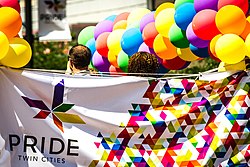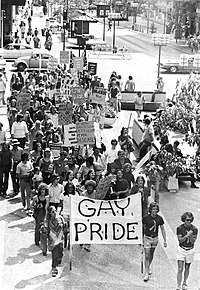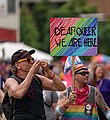Twin Cities Pride
| Twin Cities Pride | |
|---|---|
 Parade banner (2012). | |
| Frequency | Annually in June |
| Location(s) | Minneapolis, Minnesota |
| Attendance | 600,000 |
| Website | tcpride |
Twin Cities Pride, sometimes Twin Cities LGBT Pride, is an American nonprofit organization in Minnesota that hosts an annual celebration each June that focuses on the LGBT community. The celebration features a pride parade which draws crowds of nearly 600,000 people.[1][2] The parade was designated the Ashley Rukes GLBT Pride Parade in honor of the late former parade organizer and transgender LGBT rights activist.[3] Other Twin Cities Pride events include a festival in Loring Park and a block party spanning multiple days.[4]
History[edit]

The Twin Cities Pride festival arose from a 50-person protest 1972 protest march in Minneapolis on the Nicollet Mall in downtown Minneapolis, commemorating the third anniversary of the Stonewall riots.[5][6] In 1973 pride events in Minnesota consisted of a "Gay Pride Week" including a picnic, a march, a dance, a softball game, and canoeing, featuring 150 attendees.[6] 1974's pride event included the first transgender speaker.[7]
In 1981 the name was changed to "Lesbian-Gay Pride." However, Stewart Van Cleve, author of "Land of 10,000 Loves: A History of Queer Minnesota" says, "there was a lot of sexism at the time towards women, in a lot of LGBTQ+ organizations," and "Lesbian" was removed from the title changing the name back to "Gay Pride" in 1982.[8] This lead to a split and the formation of an independent Lesbian Pride celebration at Powderhorn Park in Minneapolis.[6] In 1983, the two events reunified to form "Lesbian and Gay Pride" and was accompanied by the historic closure of a Minneapolis street for the Parade.[6][8]
Tensions also arose around the AIDS crisis, with a 1985 attempt to charge an entrance fee to the festival sparking public backlash.[8]
The 1990s saw expansion of Twin Cities Pride activities, including vendor stalls and non-profit booths.[7][9] The name of the organization was officially changed to "The Gay, Lesbian, Bisexual, and Transgender Pride Committee" in 1993, one of the first pride event organizations to add bisexual and transgender to its name.[6] Multiple music stages were added in the mid-1990s; attendance in 1995 reached 100,000.[9]
2010s[edit]
Events organized in June by Twin Cities Pride in the mid-2010s include family picnics, music concerts, a 5K run, and a festival featuring hundreds of exhibitors and vendors.[10] Protests in 2017 and 2018 highlighted ongoing tensions around police involvement in the parade. In 2017, a group of Black Lives Matter protesters briefly halted the LGBT Parade. They objected to police involvement in the parade after St. Anthony, MN, police officer Jeronimo Yanez's recent acquittal of killing of Philando Castile. In response to the protest, officers marched midway through the parade rather than at the front as planned.[11][12] Twin Cities Pride parades now attract almost 400,000 viewers in its route along Hennepin Avenue in downtown Minneapolis.[13] In 2018, a protest delayed the parade by an hour.[14]
2020s[edit]
In the wake of George Floyd's death in 2020 by Minneapolis police, the Twin Cities Pride festival faced controversy regarding police presence in the parade. Organizers cancelled their virtual event and endorsed an alternate "Taking Back Pride" march centering Black transgender people and protesting police involvement. This action reflected tensions within the LGBTQ+ community. Some felt traditional Pride celebrations did not adequately address police brutality against Black people, particularly Black LGBTQ+ individuals. The controversy highlighted the complex relationship between LGBTQ+ liberation and broader social justice movements. [15][16]
Archives[edit]
The archives of Twin Cities Pride, along with material from Twin Cities-area LGBT activists and Pride festival attendees, are held in the Jean-Nickolaus Tretter Collection in Gay, Lesbian, Bisexual and Transgender Studies at the University of Minnesota Libraries.[6]
Gallery[edit]
-
Twin Cities Pride banner, 2018
-
'VOTE NO Don't Limit the Freedom to Marry' banner, 2012
-
Pride Parade, Hennepin Ave, 2011
-
Marchers carrying large leather pride flag, 2008
-
Loring Park aerial during pride festival, 2005
-
Pride parade with ferris wheel in background, 2022
-
'Deaf and Queer, We Are Here' sign, 2018
-
Drag queen, Allota Shots, on the Stonewall Stage, 2018
References[edit]
- ^ "Alterna-Pride". Star Tribune. August 17, 2012. Retrieved 2016-06-18.
- ^ Cooper, Renee (2024-06-29). "600,000 expected at 2024 Twin Cities Pride Festival". KSTP.com 5 Eyewitness News. Retrieved 2024-07-13.
- ^ Friedman, Marc (16 June 2012). "Guide To The Twin Cities Pride Festival". CBS Minnesota. WCCO. Retrieved 13 July 2016.
- ^ "Big Twin Cities Pride events". Star Tribune. June 26, 2014. Retrieved 2016-06-18.
- ^ Quatrefoil Library. "History of the Gay Movement in Minnesota and the Role of the Minnesota Civil Liberties Union" (PDF). Quatrefoil Library. p. 33. Retrieved 22 June 2023.
- ^ a b c d e f Vecoli, Lisa (June 25, 2015). "Time for Pride!". continuum. University of Minnesota Libraries. Retrieved 18 June 2016.
- ^ a b "Twin Cities Pride Festival". OutHistory.org. Archived from the original on June 21, 2013. Retrieved 18 June 2016.
{{cite web}}: CS1 maint: unfit URL (link) - ^ a b c Cassel, Em (2022-06-17). "Taking Pride: A History of Twin Cities Pride at 50". Minnesota Monthly. Retrieved 2024-07-13.
- ^ a b Kooren, Jana (June 17, 2016). "A Brief History of Pride". American Civil Liberties Union of Minnesota. Archived from the original on 2015-09-27. Retrieved 18 June 2016.
- ^ "Press Room". Twin Cities Pride. Retrieved 13 July 2016.
- ^ Xaykaothao, Doualy (25 June 2017). "Protesters briefly halt Pride parade". MPR News. Retrieved 1 July 2017..
- ^ Littlefield, Susan-Elizabeth (25 June 2017). "Pride Parade Halted Briefly By Black Lives Matter Demonstrators". CBS Minnesota. Retrieved 1 July 2017.
- ^ "Minneapolis Pride Parade fills streets with rainbow colors". Twin Cities Pioneer Press. June 27, 2015. Retrieved 18 June 2016.
- ^ "'Pride, not prejudice': Despite protest, Pride parade proceeds". Star Tribune.
- ^ "LGBTQ Pride at 50: Focus shifts amid pandemic, racial unrest". AP News. 2020-06-26. Retrieved 2024-07-13.
- ^ "Pride celebration takes on new meaning this year". MPR News. 2020-06-27. Retrieved 2024-07-13.
External links[edit]
- Website of Twin Cities Pride
- 2004 oral history[permanent dead link] of Twin Cities Pride published by City Pages








